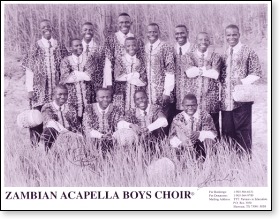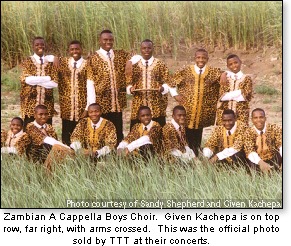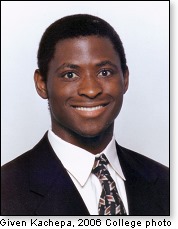Trafficking in Your Own Backyard
You may think, "This cannot happen to anyone in my family...." However, human trafficking and slavery happens to children just like yours all over the world every day. We do not want to scare you, but we want you to be aware.
One such trafficking and slavery operation took place only 20 miles from this writer's home in North Central Texas.
A so-called "Christian" non-profit organization based in Sherman, TX, exploited and imported orphaned Zambian boys under the guise of forming a world touring "Zambian A Cappella Boys Choir." Young Given Kapecha was one of 67 Zambian boys who fell victim to this trafficking and "forced labor" swindle. Given's narrative, in an interview with this writer, is below.
 Given Kapecha’s story
Given Kapecha’s storyA charity group from Texas called "Teaching Teachers to Teach" [TTT] had started to help build schools in Zambia. When some of the TTT staff heard Given's boys choir, they were impressed with the beauty of their voices and the rich sound they made singing a cappella, that is, without any instrumental accompaniment. One couple from TTT decided to bring a choir to the United States and put on concerts to raise funds for school building in Zambia. They were right about the choir; in America, people were willing to pay a lot of money for concerts and to make large donations. Sadly, the money proved too great a temptation. Instead of sending money back to the boys' families and building schools, the couple began to keep the money themselves, while demanding more and more work from the boys.
 Given, aged eleven, was the youngest member of a choir that came to the US in 1998. The rosy promises made to the choirboys before they left home turned into a nightmare for them in America. For nineteen months, the boys were made to sing four to seven concerts a day. If they were tired or sick, they would be threatened. When not singing, they were made to dig a swimming pool hole at the headquarters by hand. They were housed in a trailer. If they complained about anything, their "boss" would cut off the gas so they could not cook. Denied any medical care, several of the boys became seriously ill. When they were much later rescued and given check-ups, three of the boys proved to have positive tuberculosis.
Given, aged eleven, was the youngest member of a choir that came to the US in 1998. The rosy promises made to the choirboys before they left home turned into a nightmare for them in America. For nineteen months, the boys were made to sing four to seven concerts a day. If they were tired or sick, they would be threatened. When not singing, they were made to dig a swimming pool hole at the headquarters by hand. They were housed in a trailer. If they complained about anything, their "boss" would cut off the gas so they could not cook. Denied any medical care, several of the boys became seriously ill. When they were much later rescued and given check-ups, three of the boys proved to have positive tuberculosis.
The boys kept singing in the hope that some of the funds collected were being sent home to ease the poverty of their families. After more than a year of bad treatment, the boys realized that no money had been sent home to their families. They began to resist their "boss" who quickly moved to deport the three oldest boys. His crime unraveled when the U.S. Department of Immigration officials began to question the boys and discovered what had happened. At first, it was hard for officials to believe that a choir had been caught up in human trafficking and exploitation. However, as the facts mounted, the boys were rescued and given a chance to stay in the US. Given Kachepa now lives with his foster-family, Deetz and Sandy Shepherd, in Texas, and speaks out against human trafficking whenever he can.
Today, at 19 years of age, Given Kachepa is raising funds to help build schools in his native Zambia. His foster Mom, Sandy Shepherd, explained to this writer how her family took Given into their home: "We already had 3 daughters in our family, and it seems that God had brought us a son in Given. I [may not] look like his mom, but in my heart, he is my son. We have all been blessed with our relationship with Given."
Given attends college and excels in his work and grades. He recently told this journalist: "My T-Visa was granted in August 2003, which allows me to stay in the United States and further my education. Now I can go on with my life."

A condensed version was published in the February and April 2006 issue of Catholic World Report.
Read all 16 columns on the subject of Trafficking of Human Slaves by Barbara Kralis at "21st Century Slavery," "Modern Day Slavery Flourishes," "Different Forms of Human Slavery," "Child Sex Tourism," "Slavery as Domestic Servitude," "Combatant Human Slaves," "Involuntary Human Servitude," "Child Slaves for Sport," "Trafficking
Barbara Kralis, the article's author, writes for various Christian and conservative publications. Her columns have been featured at RenewAmerica.us, Catholic World Report, Alliance Defense Fund, Intellectual Conservative, Life Issues, Catholic Culture, The Wanderer newspaper, Phil Brennan's WOW, ChronWatch, North Carolina Conservative, MichNews, Catholic Citizens, Illinois Family Institute, Illinois Leader, New Oxford Review, Seattle Catholic, Faithful Voice, NewsBull, and others. She and her husband, Mitch, live in the great State of Texas, and co-direct the Jesus Through Mary Catholic Foundation. She can be reached at: [email protected].
© 2006 Barbara Kralis
This item 7103 digitally provided courtesy of CatholicCulture.org






